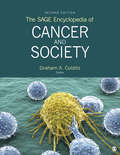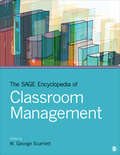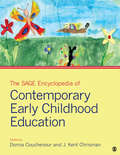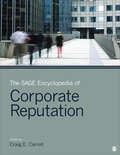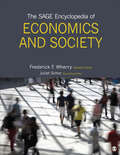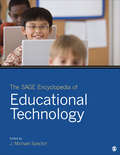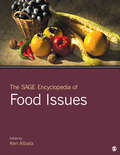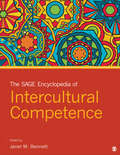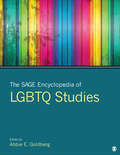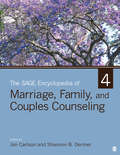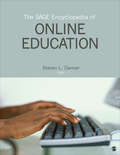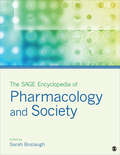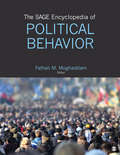- Table View
- List View
The SAGE Encyclopedia of Cancer and Society
by Graham A. ColditzThe first edition of the Encyclopedia of Cancer and Society was published in 2007 and received a 2008 Editors’ Choice Award from Booklist. It served as a general, non-technical resource focusing on cancer from the perspective of the social and behavioral sciences, exploring social and economic impacts, the “business” of cancer, advertising of drugs and treatment centers, how behavior change could offer great potential for cancer prevention, environmental risks, food additives and regulation, the relation between race and ethnicity and cancer risk, socioeconomic status, controversies—both scientific and political—in cancer treatment and research, country-by-country entries on cancer around the world, and more. Given various developments in the field including new drug treatments, political controversies over use of the vaccines Gardasil and Cervarix with young girls to prevent cervical cancer, and unexpected upticks in the prevalence of adult smoking within the U.S. following decades of decline, the SAGE Encyclopedia of Cancer and Society, Second Edition serves as an updated and more current encyclopedia that addresses concerns pertaining to this topic. Key Features: · Approximately half of the 700 first-edition articles revised and updated · 30+ new entries covering new developments since 2006 · Signed entries with cross-references · Further Readings accompanied by pedagogical elements · New Reader’s Guide · Updated Chronology, Resource Guide, Glossary, and through new Index The SAGE Encyclopedia of Cancer and Society, Second Edition serves as a reliable and precise source for students and researchers with an interest in social and behavioral sciences and seeks to better understand the continuously evolving subject matter of cancer and society.
The SAGE Encyclopedia of Cancer and Society
by Graham A. ColditzThe first edition of the Encyclopedia of Cancer and Society was published in 2007 and received a 2008 Editors’ Choice Award from Booklist. It served as a general, non-technical resource focusing on cancer from the perspective of the social and behavioral sciences, exploring social and economic impacts, the “business” of cancer, advertising of drugs and treatment centers, how behavior change could offer great potential for cancer prevention, environmental risks, food additives and regulation, the relation between race and ethnicity and cancer risk, socioeconomic status, controversies—both scientific and political—in cancer treatment and research, country-by-country entries on cancer around the world, and more. Given various developments in the field including new drug treatments, political controversies over use of the vaccines Gardasil and Cervarix with young girls to prevent cervical cancer, and unexpected upticks in the prevalence of adult smoking within the U.S. following decades of decline, the SAGE Encyclopedia of Cancer and Society, Second Edition serves as an updated and more current encyclopedia that addresses concerns pertaining to this topic. Key Features: · Approximately half of the 700 first-edition articles revised and updated · 30+ new entries covering new developments since 2006 · Signed entries with cross-references · Further Readings accompanied by pedagogical elements · New Reader’s Guide · Updated Chronology, Resource Guide, Glossary, and through new Index The SAGE Encyclopedia of Cancer and Society, Second Edition serves as a reliable and precise source for students and researchers with an interest in social and behavioral sciences and seeks to better understand the continuously evolving subject matter of cancer and society.
The SAGE Encyclopedia of Classroom Management
by W. George ScarlettA teacher’s ability to manage the classroom strongly influences the quality of teaching and learning that can be accomplished. Among the most pressing concerns for inexperienced teachers is classroom management, a concern of equal importance to the general public in light of behavior problems and breakdowns in discipline that grab newspaper headlines. But classroom management is not just about problems and what to do when things go wrong and chaos erupts. It’s about how to run a classroom so as to elicit the best from even the most courteous group of students. An array of skills is needed to produce such a learning environment. The SAGE Encyclopedia of Classroom Management raises issues and introduces evidence-based, real-world strategies for creating and maintaining well-managed classrooms where learning thrives. Students studying to become teachers will need to develop their own classroom management strategies consistent with their own philosophies of teaching and learning. This work aims to open their eyes to the range of issues and the array of skills they might integrate into their unique teaching styles. Key Features: 325 signed entries organized in A-to-Z fashion across two volumes Reader′s Guide grouping related entries thematically References/Further Readings and Cross-References sections Chronology in the back matter Resource Guide in the appendix This encyclopedia is an excellent scholarly source for students who are pursuing a degree or position in the field of education. The SAGE Encyclopedia of Classroom Management is an ideal source for all academic and public libraries.
The SAGE Encyclopedia of Classroom Management
by W. George ScarlettA teacher’s ability to manage the classroom strongly influences the quality of teaching and learning that can be accomplished. Among the most pressing concerns for inexperienced teachers is classroom management, a concern of equal importance to the general public in light of behavior problems and breakdowns in discipline that grab newspaper headlines. But classroom management is not just about problems and what to do when things go wrong and chaos erupts. It’s about how to run a classroom so as to elicit the best from even the most courteous group of students. An array of skills is needed to produce such a learning environment. The SAGE Encyclopedia of Classroom Management raises issues and introduces evidence-based, real-world strategies for creating and maintaining well-managed classrooms where learning thrives. Students studying to become teachers will need to develop their own classroom management strategies consistent with their own philosophies of teaching and learning. This work aims to open their eyes to the range of issues and the array of skills they might integrate into their unique teaching styles. Key Features: 325 signed entries organized in A-to-Z fashion across two volumes Reader′s Guide grouping related entries thematically References/Further Readings and Cross-References sections Chronology in the back matter Resource Guide in the appendix This encyclopedia is an excellent scholarly source for students who are pursuing a degree or position in the field of education. The SAGE Encyclopedia of Classroom Management is an ideal source for all academic and public libraries.
The SAGE Encyclopedia of Contemporary Early Childhood Education
by J. Kent Chrisman Donna CouchenourThe general public often views early childhood education as either simply "babysitting" or as preparation for later learning. Of course, both viewpoints are simplistic. Deep understanding of child development, best educational practices based on development, emergent curriculum, cultural competence and applications of family systems are necessary for high-quality early education. Highly effective early childhood education is rare in that it requires collaboration and transitions among a variety of systems for children from birth through eight years of age. The SAGE Encyclopedia of Contemporary Early Childhood Education presents in three comprehensive volumes advanced research, accurate practical applications of research, historical foundations and key facts from the field of contemporary early childhood education. Through approximately 425 entries, this work includes all areas of child development – physical, cognitive, language, social, emotional, aesthetic – as well as comprehensive review of best educational practices with young children, effective preparation for early childhood professionals and policy making practices, and addresses such questions as: · How is the field of early childhood education defined? · What are the roots of this field of study? · How is the history of early childhood education similar to yet different from the study of public education? · What are the major influences on understandings of best practices in early childhood education?
The SAGE Encyclopedia of Contemporary Early Childhood Education
by J. Kent Chrisman Donna CouchenourThe general public often views early childhood education as either simply "babysitting" or as preparation for later learning. Of course, both viewpoints are simplistic. Deep understanding of child development, best educational practices based on development, emergent curriculum, cultural competence and applications of family systems are necessary for high-quality early education. Highly effective early childhood education is rare in that it requires collaboration and transitions among a variety of systems for children from birth through eight years of age. The SAGE Encyclopedia of Contemporary Early Childhood Education presents in three comprehensive volumes advanced research, accurate practical applications of research, historical foundations and key facts from the field of contemporary early childhood education. Through approximately 425 entries, this work includes all areas of child development – physical, cognitive, language, social, emotional, aesthetic – as well as comprehensive review of best educational practices with young children, effective preparation for early childhood professionals and policy making practices, and addresses such questions as: · How is the field of early childhood education defined? · What are the roots of this field of study? · How is the history of early childhood education similar to yet different from the study of public education? · What are the major influences on understandings of best practices in early childhood education?
The SAGE Encyclopedia of Corporate Reputation
by Craig E. CarrollWhat creates corporate reputations and how should organizations respond? Corporate reputation is a growing research field in disciplines as diverse as communication, management, marketing, industrial and organizational psychology, and sociology. As a formal area of academic study, it is relatively young with roots in the 1980s and the emergence of specialized reputation rankings for industries, products/services, and performance dimensions and for regions. Such rankings resulted in competition between organizations and the alignment of organizational activities to qualify and improve standings in the rankings. In addition, today’s changing stakeholder expectations, the growth of advocacy, demand for more disclosures and greater transparency, and globalized, mediatized environments create new challenges, pitfalls, and opportunities for organizations. Successfully engaging, dealing with, and working through reputational challenges requires an understanding of options and tools for organizational decision-making and stakeholder engagement. For the first time, the vast and important field of corporate reputation is explored in the format of an encyclopedic reference. The SAGE Encyclopedia of Corporate Reputation comprehensively overviews concepts and techniques for identifying, building, measuring, monitoring, evaluating, maintaining, valuing, living up to and/or changing corporate reputations. Key features include: 300 signed entries are organized in A-to-Z fashion in 2 volumes available in a choice of electronic or print formats Entries conclude with Cross-References and Further Readings to guide students to in-depth resources. Although organized A-to-Z, a thematic “Reader’s Guide” in the front matter groups related entries by broad areas A Chronology provides historical perspective on the development of corporate reputation as a discrete field of study. A Resource Guide in the back matter lists classic books, key journals, associations, websites, and selected degree programs of relevance to corporate reputation. A General Bibliography will be accompanied by visual maps noting the relationships between the various disciplines touching upon corporate reputation studies. The work concludes with a comprehensive Index, which—in the electronic version—combines with the Reader’s Guide and Cross-References to provide thorough search-and-browse capabilities
The SAGE Encyclopedia of Corporate Reputation
by Craig E. CarrollWhat creates corporate reputations and how should organizations respond? Corporate reputation is a growing research field in disciplines as diverse as communication, management, marketing, industrial and organizational psychology, and sociology. As a formal area of academic study, it is relatively young with roots in the 1980s and the emergence of specialized reputation rankings for industries, products/services, and performance dimensions and for regions. Such rankings resulted in competition between organizations and the alignment of organizational activities to qualify and improve standings in the rankings. In addition, today’s changing stakeholder expectations, the growth of advocacy, demand for more disclosures and greater transparency, and globalized, mediatized environments create new challenges, pitfalls, and opportunities for organizations. Successfully engaging, dealing with, and working through reputational challenges requires an understanding of options and tools for organizational decision-making and stakeholder engagement. For the first time, the vast and important field of corporate reputation is explored in the format of an encyclopedic reference. The SAGE Encyclopedia of Corporate Reputation comprehensively overviews concepts and techniques for identifying, building, measuring, monitoring, evaluating, maintaining, valuing, living up to and/or changing corporate reputations. Key features include: 300 signed entries are organized in A-to-Z fashion in 2 volumes available in a choice of electronic or print formats Entries conclude with Cross-References and Further Readings to guide students to in-depth resources. Although organized A-to-Z, a thematic “Reader’s Guide” in the front matter groups related entries by broad areas A Chronology provides historical perspective on the development of corporate reputation as a discrete field of study. A Resource Guide in the back matter lists classic books, key journals, associations, websites, and selected degree programs of relevance to corporate reputation. A General Bibliography will be accompanied by visual maps noting the relationships between the various disciplines touching upon corporate reputation studies. The work concludes with a comprehensive Index, which—in the electronic version—combines with the Reader’s Guide and Cross-References to provide thorough search-and-browse capabilities
The SAGE Encyclopedia of Economics and Society
by Juliet B. Schor Dr Frederick F. WherryEconomics is the nexus and engine that runs society, affecting societal well-being, raising standards of living when economies prosper or lowering citizens through class structures when economies perform poorly. Our society only has to witness the booms and busts of the past decade to see how economics profoundly affects the cores of societies around the world. From a household budget to international trade, economics ranges from the micro- to the macro-level. It relates to a breadth of social science disciplines that help describe the content of the proposed encyclopedia, which will explicitly approach economics through varied disciplinary lenses. Although there are encyclopedias of covering economics (especially classic economic theory and history), the SAGE Encyclopedia of Economics and Society emphasizes the contemporary world, contemporary issues, and society. Features: 4 volumes with approximately 800 signed articles ranging from 1,000 to 5,000 words each are presented in a choice of print or electronic editions Organized A-to-Z with a thematic Reader's Guide in the front matter groups related entries Articles conclude with References & Future Readings to guide students to the next step on their research journeys Cross-references between and among articles combine with a thorough Index and the Reader's Guide to enhance search-and-browse in the electronic version Pedagogical elements include a Chronology of Economics and Society, Resource Guide, and Glossary This academic, multi-author reference work will serve as a general, non-technical resource for students and researchers within social science programs who seek to better understand economics through a contemporary lens.
The SAGE Encyclopedia of Economics and Society
by Juliet B. Schor Dr Frederick F. WherryEconomics is the nexus and engine that runs society, affecting societal well-being, raising standards of living when economies prosper or lowering citizens through class structures when economies perform poorly. Our society only has to witness the booms and busts of the past decade to see how economics profoundly affects the cores of societies around the world. From a household budget to international trade, economics ranges from the micro- to the macro-level. It relates to a breadth of social science disciplines that help describe the content of the proposed encyclopedia, which will explicitly approach economics through varied disciplinary lenses. Although there are encyclopedias of covering economics (especially classic economic theory and history), the SAGE Encyclopedia of Economics and Society emphasizes the contemporary world, contemporary issues, and society. Features: 4 volumes with approximately 800 signed articles ranging from 1,000 to 5,000 words each are presented in a choice of print or electronic editions Organized A-to-Z with a thematic Reader's Guide in the front matter groups related entries Articles conclude with References & Future Readings to guide students to the next step on their research journeys Cross-references between and among articles combine with a thorough Index and the Reader's Guide to enhance search-and-browse in the electronic version Pedagogical elements include a Chronology of Economics and Society, Resource Guide, and Glossary This academic, multi-author reference work will serve as a general, non-technical resource for students and researchers within social science programs who seek to better understand economics through a contemporary lens.
The SAGE Encyclopedia of Educational Technology
by Professor J. Michael SpectorThe SAGE Encyclopedia of Educational Technology examines information on leveraging the power of technology to support teaching and learning. While using innovative technology to educate individuals is certainly not a new topic, how it is approached, adapted, and used toward the services of achieving real gains in student performance is extremely pertinent. This two-volume encyclopedia explores such issues, focusing on core topics and issues that will retain relevance in the face of perpetually evolving devices, services, and specific techniques. As technology evolves and becomes even more low-cost, easy-to-use, and more accessible, the education sector will evolve alongside it. For instance, issues surrounding reasoning behind how one study has shown students retain information better in traditional print formats are a topic explored within the pages of this new encyclopedia. Features: A collection of 300-350 entries are organized in A-to-Z fashion in 2 volumes available in a choice of print or electronic formats. Entries, authored by key figures in the field, conclude with cross references and further readings. A detailed index, the Reader’s Guide themes, and cross references combine for search-and-browse in the electronic version. This reference encyclopedia is a reliable and precise source on educational technology and a must-have reference for all academic libraries.
The SAGE Encyclopedia of Educational Technology
by Professor J. Michael SpectorThe SAGE Encyclopedia of Educational Technology examines information on leveraging the power of technology to support teaching and learning. While using innovative technology to educate individuals is certainly not a new topic, how it is approached, adapted, and used toward the services of achieving real gains in student performance is extremely pertinent. This two-volume encyclopedia explores such issues, focusing on core topics and issues that will retain relevance in the face of perpetually evolving devices, services, and specific techniques. As technology evolves and becomes even more low-cost, easy-to-use, and more accessible, the education sector will evolve alongside it. For instance, issues surrounding reasoning behind how one study has shown students retain information better in traditional print formats are a topic explored within the pages of this new encyclopedia. Features: A collection of 300-350 entries are organized in A-to-Z fashion in 2 volumes available in a choice of print or electronic formats. Entries, authored by key figures in the field, conclude with cross references and further readings. A detailed index, the Reader’s Guide themes, and cross references combine for search-and-browse in the electronic version. This reference encyclopedia is a reliable and precise source on educational technology and a must-have reference for all academic libraries.
The SAGE Encyclopedia of Food Issues
by Ken AlbalaThe SAGE Encyclopedia of Food Issues explores the topic of food across multiple disciplines within the social sciences and related areas including business, consumerism, marketing, and environmentalism. In contrast to the existing reference works on the topic of food that tend to fall into the categories of cultural perspectives, this carefully balanced academic encyclopedia focuses on social and policy aspects of food production, safety, regulation, labeling, marketing, distribution, and consumption. A sampling of general topic areas covered includes Agriculture, Labor, Food Processing, Marketing and Advertising, Trade and Distribution, Retail and Shopping, Consumption, Food Ideologies, Food in Popular Media, Food Safety, Environment, Health, Government Policy, and Hunger and Poverty. This encyclopedia introduces students to the fascinating, and at times contentious, and ever-so-vital field involving food issues. Key Features: Contains approximately 500 signed entries concluding with cross-references and suggestions for further readings Organized A-to-Z with a thematic “Reader’s Guide” in the front matter grouping related entries by general topic area Provides a Resource Guide and a detailed and comprehensive Index along with robust search-and-browse functionality in the electronic edition This three-volume reference work will serve as a general, non-technical resource for students and researchers who seek to better understand the topic of food and the issues surrounding it.
The SAGE Encyclopedia of Food Issues
by Ken AlbalaThe SAGE Encyclopedia of Food Issues explores the topic of food across multiple disciplines within the social sciences and related areas including business, consumerism, marketing, and environmentalism. In contrast to the existing reference works on the topic of food that tend to fall into the categories of cultural perspectives, this carefully balanced academic encyclopedia focuses on social and policy aspects of food production, safety, regulation, labeling, marketing, distribution, and consumption. A sampling of general topic areas covered includes Agriculture, Labor, Food Processing, Marketing and Advertising, Trade and Distribution, Retail and Shopping, Consumption, Food Ideologies, Food in Popular Media, Food Safety, Environment, Health, Government Policy, and Hunger and Poverty. This encyclopedia introduces students to the fascinating, and at times contentious, and ever-so-vital field involving food issues. Key Features: Contains approximately 500 signed entries concluding with cross-references and suggestions for further readings Organized A-to-Z with a thematic “Reader’s Guide” in the front matter grouping related entries by general topic area Provides a Resource Guide and a detailed and comprehensive Index along with robust search-and-browse functionality in the electronic edition This three-volume reference work will serve as a general, non-technical resource for students and researchers who seek to better understand the topic of food and the issues surrounding it.
The SAGE Encyclopedia of Intercultural Competence
by Janet M BennettIn 1980, SAGE published Geert Hofstede’s Culture’s Consequences. It opens with a quote from Blaise Pascal: “There are truths on this side of the Pyrenees that are falsehoods on the other.” The book became a classic—one of the most cited sources in theSocial Science Citation Index—and subsequently appeared in a second edition in 2001. This new SAGE Encyclopedia of Intercultural Competence picks up on themes explored in that book. Cultural competence refers to the set of attitudes, practices, and policies that enables a person or agency to work well with people from differing cultural groups. Other related terms include cultural sensitivity, transcultural skills, diversity competence, and multicultural expertise. What defines a culture? What barriers might block successful communication between individuals or agencies of differing cultures? How can those barriers be understood and navigated to enhance intercultural communication and understanding? These questions and more are explained within the pages of this new reference work. Key Features: 300 to 350 entries organized in A-to-Z fashion in two volumes Signed entries that conclude with Cross-References and Suggestions for Further Readings Thematic “Reader’s Guide” in the front matter grouping related entries by broad topic areas Chronology that provides a historical perspective of the development of cultural competence as a discrete field of study Resources appendix and a comprehensive Index The SAGE Encyclopedia of Intercultural Competence is an authoritative and rigorous source on intercultural competence and related issues, making it a must-have reference for all academic libraries.
The SAGE Encyclopedia of Intercultural Competence
by Janet M BennettIn 1980, SAGE published Geert Hofstede’s Culture’s Consequences. It opens with a quote from Blaise Pascal: “There are truths on this side of the Pyrenees that are falsehoods on the other.” The book became a classic—one of the most cited sources in theSocial Science Citation Index—and subsequently appeared in a second edition in 2001. This new SAGE Encyclopedia of Intercultural Competence picks up on themes explored in that book. Cultural competence refers to the set of attitudes, practices, and policies that enables a person or agency to work well with people from differing cultural groups. Other related terms include cultural sensitivity, transcultural skills, diversity competence, and multicultural expertise. What defines a culture? What barriers might block successful communication between individuals or agencies of differing cultures? How can those barriers be understood and navigated to enhance intercultural communication and understanding? These questions and more are explained within the pages of this new reference work. Key Features: 300 to 350 entries organized in A-to-Z fashion in two volumes Signed entries that conclude with Cross-References and Suggestions for Further Readings Thematic “Reader’s Guide” in the front matter grouping related entries by broad topic areas Chronology that provides a historical perspective of the development of cultural competence as a discrete field of study Resources appendix and a comprehensive Index The SAGE Encyclopedia of Intercultural Competence is an authoritative and rigorous source on intercultural competence and related issues, making it a must-have reference for all academic libraries.
The SAGE Encyclopedia of LGBTQ Studies
by Abbie E. GoldbergThis far-reaching and contemporary new Encyclopedia examines and explores the lives and experiences of Lesbian, Gay, Bisexual, Transgender and Queer (LGBTQ) individuals, focusing on the contexts and forces that shape their lives. The work focuses on LGBTQ issues and identity primarily through the lenses of psychology, human development and sociology, emphasizing queer, feminist and ecological perspectives on the topic, and addresses questions such as: · What are the key theories used to understand variations in sexual orientation and gender identity? · How do Gay-Straight Alliances (GSA) affect LGBTQ youth? · How do LGBTQ people experience the transition to parenthood? · How does sexual orientation intersect with other key social locations, such as race, to shape experience and identity? · What are the effects of marriage equality on sexual minority individuals and couples? Top researchers and clinicians contribute to the 400 signed entries, from fields such as: · Psychology · Human Development · Gender/Queer Studies · Sexuality Studies · Social Work · Sociology The SAGE Encyclopedia of LGBTQ Studies is an essential resource for researchers interested in an interdisciplinary perspective on LGBTQ lives and issues.
The SAGE Encyclopedia of LGBTQ Studies
by Abbie E. GoldbergThis far-reaching and contemporary new Encyclopedia examines and explores the lives and experiences of Lesbian, Gay, Bisexual, Transgender and Queer (LGBTQ) individuals, focusing on the contexts and forces that shape their lives. The work focuses on LGBTQ issues and identity primarily through the lenses of psychology, human development and sociology, emphasizing queer, feminist and ecological perspectives on the topic, and addresses questions such as: · What are the key theories used to understand variations in sexual orientation and gender identity? · How do Gay-Straight Alliances (GSA) affect LGBTQ youth? · How do LGBTQ people experience the transition to parenthood? · How does sexual orientation intersect with other key social locations, such as race, to shape experience and identity? · What are the effects of marriage equality on sexual minority individuals and couples? Top researchers and clinicians contribute to the 400 signed entries, from fields such as: · Psychology · Human Development · Gender/Queer Studies · Sexuality Studies · Social Work · Sociology The SAGE Encyclopedia of LGBTQ Studies is an essential resource for researchers interested in an interdisciplinary perspective on LGBTQ lives and issues.
The SAGE Encyclopedia of Marriage, Family, and Couples Counseling
by Dr Jon Carlson Dr Shannon B. DermerThe SAGE Encyclopedia of Marriage, Family and Couples Counseling is a new, all-encompassing, landmark work for researchers seeking to broaden their knowledge of this vast and diffuse field. Marriage and family counseling programs are established at institutions worldwide, yet there is no current work focused specifically on family therapy. While other works have discussed various methodologies, cases, niche aspects of the field and some broader views of counseling in general, this authoritative Encyclopedia provides readers with a fully comprehensive and accessible reference to aid in understanding the full scope and diversity of theories, approaches, and techniques and how they address various life events within the unique dynamics of families, couples, and related interpersonal relationships. Key topics include: Assessment Communication Coping Diversity Interventions and Techniques Life Events/Transitions Sexuality Work/Life Issues, and more Key features include: More than 500 signed articles written by key figures in the field span four comprehensive volumes Front matter includes a Reader’s Guide that groups related entries thematically Back matter includes a history of the development of the field, a Resource Guide to key associations, websites, and journals, a selected Bibliography of classic publications, and a detailed Index All entries conclude with Further Readings and Cross References to related entries to aid the reader in their research journey
The SAGE Encyclopedia of Marriage, Family, and Couples Counseling
by Dr Jon Carlson Dr Shannon B. DermerThe SAGE Encyclopedia of Marriage, Family and Couples Counseling is a new, all-encompassing, landmark work for researchers seeking to broaden their knowledge of this vast and diffuse field. Marriage and family counseling programs are established at institutions worldwide, yet there is no current work focused specifically on family therapy. While other works have discussed various methodologies, cases, niche aspects of the field and some broader views of counseling in general, this authoritative Encyclopedia provides readers with a fully comprehensive and accessible reference to aid in understanding the full scope and diversity of theories, approaches, and techniques and how they address various life events within the unique dynamics of families, couples, and related interpersonal relationships. Key topics include: Assessment Communication Coping Diversity Interventions and Techniques Life Events/Transitions Sexuality Work/Life Issues, and more Key features include: More than 500 signed articles written by key figures in the field span four comprehensive volumes Front matter includes a Reader’s Guide that groups related entries thematically Back matter includes a history of the development of the field, a Resource Guide to key associations, websites, and journals, a selected Bibliography of classic publications, and a detailed Index All entries conclude with Further Readings and Cross References to related entries to aid the reader in their research journey
The SAGE Encyclopedia of Online Education
by Dr Steven L. DanverOnline education, both by for-profit institutions and within traditional universities, has seen recent tremendous growth and appeal - but online education has many aspects that are not well understood. The SAGE Encyclopedia of Online Education provides a thorough and engaging reference on all aspects of this field, from the theoretical dimensions of teaching online to the technological aspects of implementing online courses—with a central focus on the effective education of students. Key topics explored through over 350 entries include: · Technology used in the online classroom · Institutions that have contributed to the growth of online education · Pedagogical basis and strategies of online education · Effectiveness and assessment · Different types of online education and best practices · The changing role of online education in the global education system
The SAGE Encyclopedia of Online Education
by Dr Steven L. DanverOnline education, both by for-profit institutions and within traditional universities, has seen recent tremendous growth and appeal - but online education has many aspects that are not well understood. The SAGE Encyclopedia of Online Education provides a thorough and engaging reference on all aspects of this field, from the theoretical dimensions of teaching online to the technological aspects of implementing online courses—with a central focus on the effective education of students. Key topics explored through over 350 entries include: · Technology used in the online classroom · Institutions that have contributed to the growth of online education · Pedagogical basis and strategies of online education · Effectiveness and assessment · Different types of online education and best practices · The changing role of online education in the global education system
The SAGE Encyclopedia of Pharmacology and Society
by Sarah E. BoslaughThe SAGE Encyclopedia of Pharmacology and Society explores the social and policy sides of the pharmaceutical industry and its pervasive influence in society. While many technical STM works explore the chemistry and biology of pharmacology and an equally large number of clinically oriented works focus on use of illegal drugs, substance abuse, and treatment, there is virtually nothing on the immensely huge business (“Big Pharma”) of creating, selling, consuming, and regulating legal drugs. With this new Encyclopedia, the topic of socioeconomic, business and consumer, and legal and ethical issues of the pharmaceutical industry in contemporary society around the world are addressed. Key Features: 800 signed articles, authored by prominent scholars, are arranged A-to-Z and published in a choice of electronic or print formats Although arranged A-to-Z, a Reader's Guide in the front matter groups articles by thematic areas Front matter also includes a Chronology highlighting significant developments in this field All articles conclude with Further Readings and Cross References to related articles Back matter includes an annotated Resource Guide to further research, a Glossary, Appendices (e.g., statistics on the amount and types of drugs prescribed, etc.), and a detailed Index The Index, Reader’s Guide, and Cross References combine for search-and-browse capabilities in the electronic edition The SAGE Encyclopedia of Pharmacology and Society is an authoritative and rigorous source addressing the pharmacology industry and how it influences society, making it a must-have reference for all academic libraries as a source for both students and researchers to utilize.
The SAGE Encyclopedia of Pharmacology and Society
by Sarah E. BoslaughThe SAGE Encyclopedia of Pharmacology and Society explores the social and policy sides of the pharmaceutical industry and its pervasive influence in society. While many technical STM works explore the chemistry and biology of pharmacology and an equally large number of clinically oriented works focus on use of illegal drugs, substance abuse, and treatment, there is virtually nothing on the immensely huge business (“Big Pharma”) of creating, selling, consuming, and regulating legal drugs. With this new Encyclopedia, the topic of socioeconomic, business and consumer, and legal and ethical issues of the pharmaceutical industry in contemporary society around the world are addressed. Key Features: 800 signed articles, authored by prominent scholars, are arranged A-to-Z and published in a choice of electronic or print formats Although arranged A-to-Z, a Reader's Guide in the front matter groups articles by thematic areas Front matter also includes a Chronology highlighting significant developments in this field All articles conclude with Further Readings and Cross References to related articles Back matter includes an annotated Resource Guide to further research, a Glossary, Appendices (e.g., statistics on the amount and types of drugs prescribed, etc.), and a detailed Index The Index, Reader’s Guide, and Cross References combine for search-and-browse capabilities in the electronic edition The SAGE Encyclopedia of Pharmacology and Society is an authoritative and rigorous source addressing the pharmacology industry and how it influences society, making it a must-have reference for all academic libraries as a source for both students and researchers to utilize.
The SAGE Encyclopedia of Political Behavior
by Fathali M. MoghaddamThe SAGE Encyclopedia of Political Behavior explores the intersection of psychology, political science, sociology, communications, and human behavior to better understand why and how people interact with political processes. Bringing together scholars from around the world, the encyclopedia integrates theories, research, and case studies from a variety of disciplines to help readers better understand the complexities of political behavior. Contributors analyze the forces that shape the behavior of individuals, groups, and social movements and how that behavior impacts political outcomes and public policy debates. In over 360 entries, the encyclopedia focuses broadly on the following topics: Cognitive processes Group identities and influence Individual political behavior International/comparative perspectives Justice and political behavior Media, discourse, and communications Policies and political behavior Political systems Security and terrorism Social political movements Theories of political behavior Voting behavior and political campaigns Aimed at college and university students, this one-of-a-kind reference covers voting patterns, interactions between groups, what makes different types of government systems appealing to different societies, and the impact of early childhood development on political beliefs, among others. Topics explored by political psychologists are of great interest in fields beyond either psychology or political science, with implications, for instance, within business and management. This title will be available online on SAGE Knowledge, the ultimate social sciences library.
